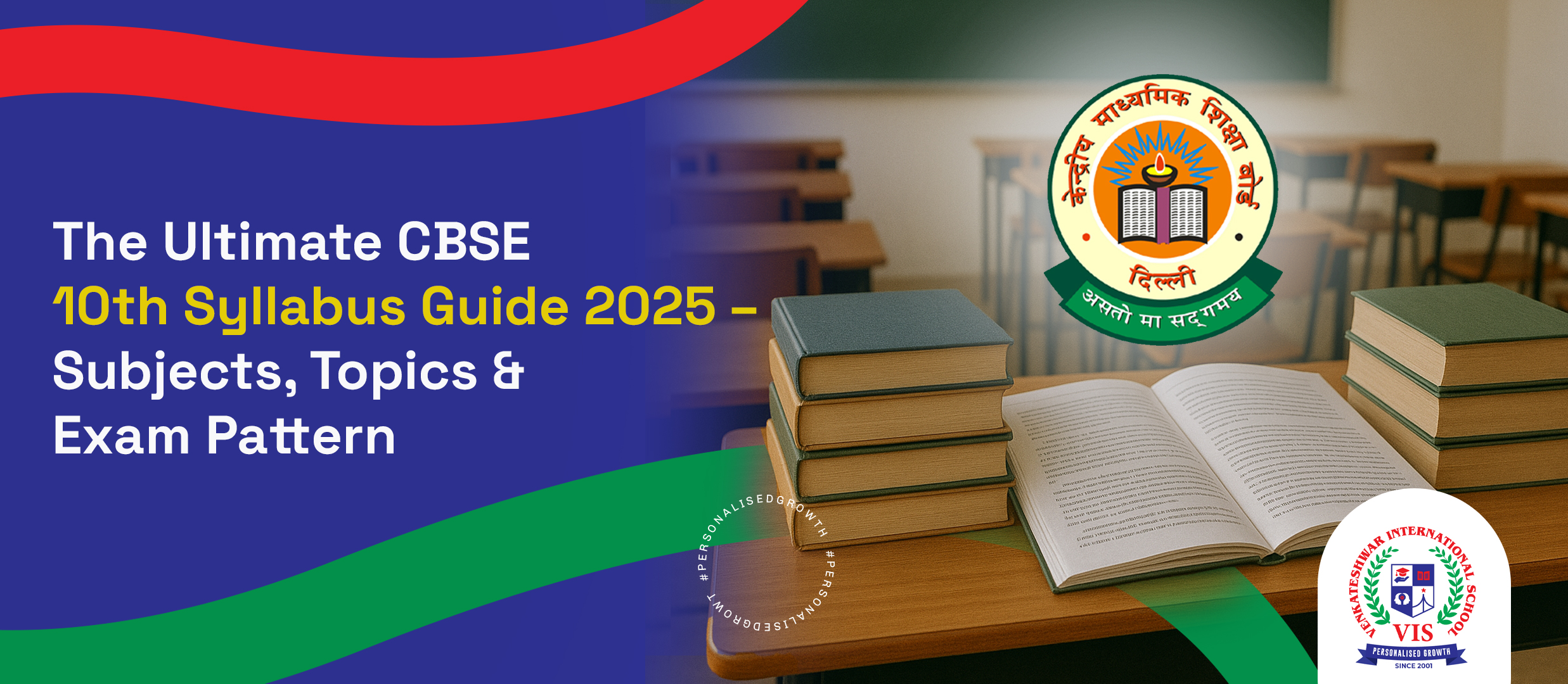The Ultimate CBSE 10th Syllabus Guide 2025 Subjects, Topics & Exam Pattern
Aug 27, 2025
Explore the complete CBSE Class 10 syllabus for Maths, Science, English & more. Get subject-wise topics, exam structure, and tips to prepare for the 2025 board exams.

The Ultimate CBSE Class 10 Syllabus Guide: What Your Child Will Learn
Preparation for the CBSE Class 10 board examination is a significant milestone for the child and his/her parent as well. Getting familiar with the entire CBSE class 10 syllabus initially will aid in having constructive and focused study planning. This syllabus guide lays out in a nutshell the 10th new syllabus CBSE for all major subjects such as maths, science, and English, so that you and your child are clear on what to expect in the board exams ahead.
The Overview of the CBSE Class 10 Syllabus
The CBSE board has designed the syllabus for CBSE 10th board exam in a manner that it is comprehensive yet manageable and tests students for conceptual clarity and application skills. The syllabus comprises core subjects such as:
Mathematics Science English Social Science Optional languages and electives
Each has a detailed syllabus for imparting understanding along with the problem-solving and analytical-thinking approach.
CBSE Syllabus For Class 10 Maths
Mathematics is considered a highly scoring subject, but it demands consistent practice.
A Class 10 syllabus with the major topics for CBSE Maths comprises:
- Number System: Real numbers and their properties
- Algebra: Polynomials, linear equations in two variables, and quadratic equations
- Geometry: Triangles, circles, and coordinate geometry
- Trigonometry: Heights and distances, basic trigonometric ratios, and identities
- Mensuration: Surface areas and volumes of solids
- Statistics and Probability: Collection and representation of data and basics of probability
Internal assessments are held for 20 marks, project work for 20 marks, and the board exam for 60 marks is designed to test the problem-solving and theoretical knowledge of the candidates.
CBSE Class 10 English Syllabus
English is divided into two papers, i.e., English Language and Literature and English Communicative.
The syllabus for class 10 CBSE English is:
- Comprehension of unseen passages
- Writing skills such as letter, story, and essay writing
- Grammar topics like tenses, clauses, and modals
- Prescribed Textbook, including chapters and poems
Emphasis is laid on communication, comprehension, and creative writing skills necessary for both academic and real-life situations.
Syllabus of CBSE Class 10 Science
Science essentially is a process-oriented term that includes Physics, Chemistry, and Biology as one single paper.
The class 10 Science syllabus under CBSE includes:
- Physics: Light: Reflection and Refraction, Electricity: Magnetic Effects of Current
- Chemistry: Chemical Reactions, Acids, Bases, Salts, Metals, and Non-metals.
- Biology: Life Processes such as Nutrition and Respiration, Control and Co-ordination, Reproduction.
While theory papers are typically weighted projects, experiments allow for the manual selection of practical skills to assess. This mix of theoretical-based tests and lab tests gives a strong grasp of core scientific principles to the students.
Other Important Subjects in CBSE 10th Syllabus
- Social Science includes History, Geography, Political Science, and Economics, embodying Nationalism, Resources, Democracy, and Development.
- Languages: Hindi, Sanskrit, and other regional languages as per the school's offerings
- Information Technology and Skill Subjects: Offered as electives by some schools
Why It Is Important to Know About the 10th New Syllabus CBSE
CBSE revises the syllabus each year to conform to modern-day education standards. Having knowledge of the 10th new syllabus CBSE keeps your child studying the appropriate material and not wasting time over outmoded topics. It also aids teachers and parents in making revision and practice timetables properly.
Tips to Prepare Based on the CBSE Class 10 Syllabus
- Download the official syllabus from CBSE Academic website to avail latest updates.
- Prepare a study schedule for all chapters with emphasis on weaker areas.
- Practice sample papers and previous year question papers at regular intervals.
- Incorporate hands-on experiments in science to develop practical knowledge.
- Develop writing and reading skills for English through practice every day.
- Take internal assessments and projects seriously as they form part of final marks.
Frequently Asked Questions (FAQs)
1. Where is the official CBSE Class 10 syllabus available?
CBSE class 10 syllabus can be downloaded from the official CBSE website : cbseacademic.nic.in
2. What are the primary subjects covered in the CBSE 10th syllabus?
The primary subjects are Mathematics, Science, English, Social Science, and language subjects such as Hindi or regional languages, and optional skill subjects.
3. Has the CBSE syllabus for Class 10 Maths changed this year?
CBSE makes periodic changes to the syllabus to cut down on overload and enhance clarity. Always refer to the new official syllabus for any modifications in chapter weightage or addition of new topics.
4. Are practical exams really important in the CBSE Class 10 Science syllabus?
Practical exams are worth 20 marks and are a must. They test your child's skill in conducting experiments and grasping scientific principles beyond textbook theory.
5. What is the passing requirement for CBSE Class 10 board exams?
Students must achieve a minimum of 33% in every subject, which includes theory and practical/internal assessments together, to pass the board exams.
6. Will there be any modification in the CBSE Class 10 English syllabus?
CBSE updates English literature and grammar parts from time to time to encompass recent texts and communication skills. Refer to the official syllabus annually.
Reading the syllabus for the CBSE 10th board exam in-depth will provide your child with a strategic edge in preparation. Utilize this manual as a blueprint to divide the subjects into practicable pieces and train towards regular practice. With proper planning, your child can confidently approach the exams and yield excellent results.